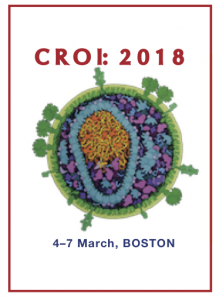Statin use might reduce risk of cancer in HIV positive people
30 March 2018. Related: Conference reports, Cancer and HIV, CROI 25 (Retrovirus) 2018.
 Simon Collins, HIV i-Base
Simon Collins, HIV i-Base
A large case-control analysis from the Veteran’s Ageing Cohort Study (VACS) reported an overall association between statin use and a reduced risk of virus-mediated cancers in HIV positive people.
Although mechanisms for statins to positively impact on the immune responses against tumor cells have been proposed, individual studies are often small. Several large meta-analyses conducted in the general population over the last five years, produced conflicting results, with only one study reporting a protective benefit against liver cancer.
Even when studies in HIV positive people have reported a benefit, these have also sometimes included small numbers with limited follow-up, or with limited cancer-specific information.
The study presented at CROI 2018 by Roger Bedimo and colleagues, was a case-control analysis from 150,000 patients (97% male, one-third are HIV positive) in VACS. From this cohort, approximately 25,000 participants who used a statin were identified from 2001 to 2012 and matched 1:2 to 50,000 non-statin users.
A smaller propensity score model involving 24,000 participants (half using a statin and half not) included approximately 5,000 HIV positive people vs 19,000 who were HIV negative, with follow-up continuing until first cancer diagnosis. This was to match for factors that were more likely to be associated with prescribing a statin, including age, calendar year, chronic infections and laboratory markers (LDL, albumin, Fib-4 index).
Cancer incidence was higher in the positive group (9.0% vs 7.1%). Cancers also occurred earlier in the HIV positive group (after 3.6 vs 4.5 years) and later in people using a statin (4.9 vs 3.7 years).
Overall, the use of a statin was associated with a lower risk of all cancers, irrespective of HIV status, but with borderline significance of a greater impact for the HIV positive group. See Table 1.
Virally mediated cancers (anal, oropharaynx, liver and NHL, but not Hodgkin’s lymphoma) were all significantly reduced in the overall cohort, with larger reductions in anal and liver cancer reductions in the HIV negative group (both HR: 0.28; 95%CI: 0.10 to 0.82). Overall, non-virus cancers were also reduced (HR: 0.63; 95%CI: 0.57 to 0.70, p<0.0001)
Both overall and in subgroups, there were no cancers where statin use was associated with an increased risk.
Out of 4,431 incident deaths in the main cohort, statin use was also associated with a significantly reduced risk of death (HR: 0.55; 95%CI: 0.50 to 0.61).
In questions after the presentation, confounding by better socioeconomic states (in people receiving satins) was ruled out as the VACS is largely a low-income health provider. Further analyses are planned to look for whether individual statins have different effects.
Table 1: Statin exposure and risk of Cancer: By HIV Status and Cancer Type
| Cancer type | All participants
HR (95% CI) |
p | HIV negative
HR (95% CI) |
HIV positive
HR (95% CI) |
p for interaction |
| Any cancer | |||||
| n=1799 | 0.61
(0.56 to 0.67) |
<0.0001 | 0.65
(0.59 to 0.72) |
0.51
(0.40 to 0.64) |
0.051 |
| AIDS-defining cancers | |||||
| n=64 | 0.61
(0.56 to 0.67) |
<0.0001 | 0.65
(0.59 to 0.72) |
0.51
(0.40 to 0.64) |
0.8 |
| Non-AIDS defining cancers | |||||
| n=1712 | 0.63
(0.58 to 0.69) |
<0.0001 | 0.67
(0.60 to 0.74) |
0.53
(0.41 to 0.67) |
0.1 |
comment
Even though statins are safe, effective and widely used, several studies have reported suboptimal management of cardiovascular risks in HIV positive cohorts, perhaps linked to a reluctance to use statins.
These data might provide an additional reason to encourage their use.
However, it is difficult to understand why HIV positive people might benefit from statins in ways that were not seen consistently in large meta-analyses in the general population.
The positive impact on reducing risk of cancer should therefore perhaps be interpreted with caution as residual confounding could not be eliminated. Even within the VA cohort (where all participants have likely lower socioeconomic status), some people might have attitudes to health and medicine that affects their decision to use statins that couldn’t be captured in this study.
Reference
Bedimo R et al. Statin exposure is associated with decreased risk of cancer. 25th CROI, 4 – 7 March 2018, Boston. Oral abstract 132.
www.croiconference.org/sessions/statin-exposure-associated-decreased-risk-cancer (abstract)
www.croiwebcasts.org/console/player/37301 (webcast)

